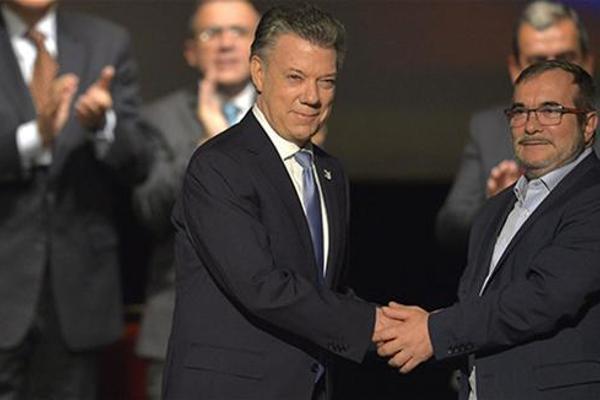Colombia, rebels sign peace in sober ceremony amid opposition
BOGOTA - Agence France-Presse


AFP photo
Colombia’s government and FARC rebels signed a controversial revised peace accord Nov. 24 to end their half-century conflict, set to be ratified in Congress despite bitter opposition.President Juan Manuel Santos and guerrilla leader Rodrigo “Timochenko” Londono signed the new deal with a pen made from a spent bullet, in a low-key ceremony in the capital Bogota.
The original deal -- signed with great fanfare in September -- was rejected by voters in a referendum last month, a shock upset that sent negotiators back to the drawing board.
The new plan bypasses a vote by the Colombian people, against bitter opposition from critics.
They say the revisions are only cosmetic and will still grant impunity for war crimes committed by the Revolutionary Armed Forces of Colombia (FARC).
Santos, who won this year’s Nobel Peace Prize for his efforts to end the conflict, said the new deal was better than the original.
“It includes the hopes and observations of the vast majority of Colombians,” he said after signing it.
“We all know in our souls that the cost of the armed conflict is too high.”
The deal was immediately sent to Congress, where it is expected to pass after being debated next week.
Santos and his allies hold a majority in the legislature.
The government and FARC both say they are under pressure for fear that their fragile ceasefire could break down.
A recent wave of alleged assassinations in conflict zones has added to calls to seal a deal fast.
But an aftermath of discord and uncertainty appears likely as opponents promised to keep resisting the peace plan, including with street protests.
“The country has spoken. It has said, ‘Yes to peace, but without impunity,’” said top opponent Alvaro Uribe, a conservative ex-president and senator.
“What we have here remains total impunity,” he told RCN television.
Speaking later in the Senate, he called for another referendum on some of the contested “basic issues” in the deal.
The government and FARC negotiators’ redrafted version of the deal includes concessions from the rebels on issues such as reparations for victims.
But Uribe complains it still ignores key demands, notably on punishing FARC leaders for the killings and kidnappings blamed on the group.
